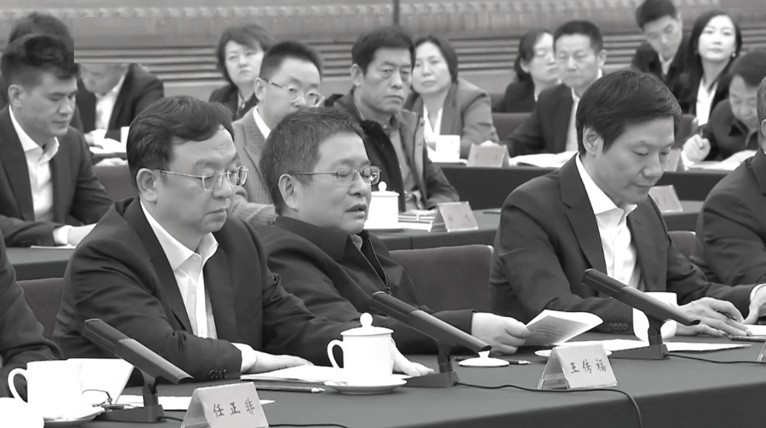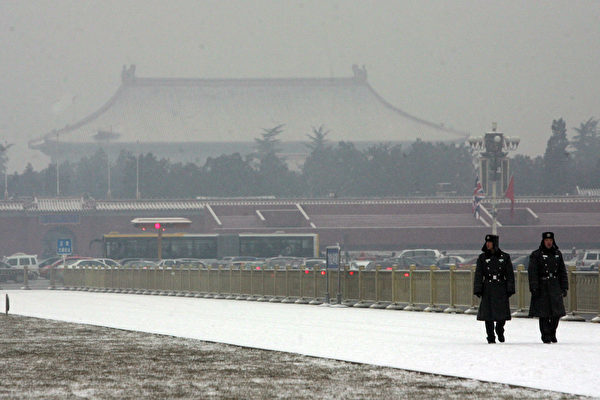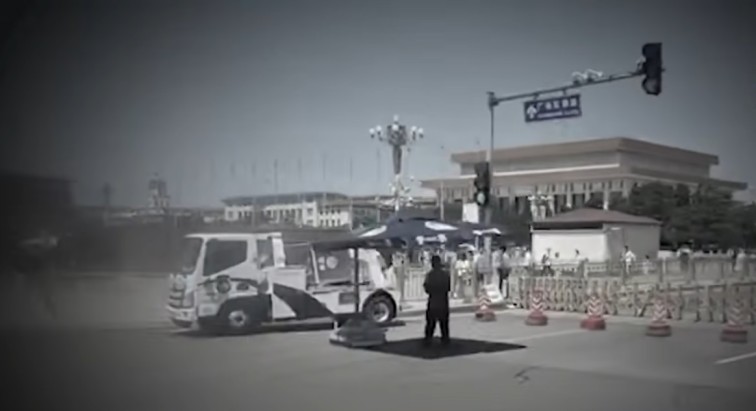On February 17, several entrepreneurs attended a CCP symposium on private enterprises. However, their expressions were grim, showing no joy despite supposedly receiving government support. (Screenshot from video)
[People News] According to the website of the CCP’s Central Commission for Discipline Inspection (CCDI), between August 18 and August 24 alone, 27 CCP officials were investigated and 12 were disciplined. Among them was a ministerial-level “female tiger” — Wang Lixia, Vice Secretary of the Inner Mongolia Party Committee and Chairwoman of the Inner Mongolia Autonomous Region Government. This brings the number of female “tigers” taken down this year to four, three of them at the ministerial level. Besides Wang Lixia, the other two were: Liu Hui, former Deputy Director of the CPPCC Education, Science, Health, and Sports Committee (announced in mid-July); and Li Weiwei, former Deputy Director of the CPPCC Population, Resources, and Environment Committee (prosecuted in late May). Another, Zhao Jinyun, former Vice Governor of Gansu Province, was prosecuted at the end of July.
The CCDI also announced that in the first half of 2025, disciplinary and supervisory organs filed 521,000 cases, disciplined 420,000 people, and gave criticism/educational or other treatments to 843,000 individuals. Among these, 43 were provincial/ministerial-level cadres. If we go by this year’s ratio — one woman among seven ministerial-level officials taken down — then out of 420,000 disciplined cadres, around 60,000 were female CCP officials.
Reviewing the fallen female corrupt officials, some once held key local positions, some came from state-owned enterprises, and some rose through the ranks unusually fast. Many were good-looking. In the CCP’s accusations, quite a few were charged with power-for-sex or power-and-money-for-sex transactions. In other words, these “female tigers” were addicted to power, wealth, and sex, often relying on all kinds of sexual liaisons with senior officials to rise, then using their authority to satisfy greed. Their corruption was no less shocking than that of their male counterparts, often jaw-dropping.
For example, Zhao Jinyun was accused of running a “family-style corruption ring,” raking in huge sums and using her position to help others secure projects and payments. Insiders say the “family-style corruption” referred to her collusion with her husband, Bao Donghong, former Party Secretary and Director of Shaanxi Provincial Tax Bureau.
Or take Li Weiwei. Born in 1958, after graduating from Hunan Normal University in 1982, she became a Chinese teacher at Zhuzhou No. 2 Middle School, a graceful figure.
Just two years later, Li was transferred to serve as Deputy Secretary of the Communist Youth League Zhuzhou Municipal Committee, and within another two years became the Secretary of that committee — a division-level position. Her path of promotion was smooth thereafter: at 32, she became Deputy Secretary of the Hunan Provincial Youth League Committee and a member of its Party leadership — a department-level cadre. Soon after, she became Deputy Party Secretary of the same committee. At 48, she jumped directly from President of the CCPIT Hunan Sub-Council to Hunan Provincial Party Standing Committee member and United Front Work Department head.
Domestic media, reporting on her abnormal career trajectory, commented: “The push behind her was immense, worthy of careful thought.” Netizens joked: “Behind every successful woman stands a group of men making silent sacrifices!” and “The new version of Li Peixia.”
Radio Free Asia, in reporting on Li’s career leap, pointed out that when she was suddenly promoted to Provincial Standing Committee and United Front chief, Hunan Party Secretary was Zhang Chunxian, Deputy Secretary was Zhou Qiang, and Organisation Department head was Qi Heping. Other media went further, stating bluntly that during her tenure as Hunan CPPCC Chairwoman, three of her Vice Chairs — Yi Pengfei, Dai Daojin, and Peng Guofu — had all been investigated before her downfall. Rumours circulated that Li’s relationship with these three men was far from ordinary.
This recalls Jiang Yanping, former Deputy General Manager of Hunan Construction Group, who climbed from a poor rural girl in Chaling County to a deputy department-level official by seducing more than 40 male leaders. Even after being jailed in the Hanshou County Detention Centre for corruption, she managed to seduce the deputy director, Wan Jiang, and became pregnant. Another example is Xu Ailian, the former mayor of Manzhouli, who rose through sexual favours. She was taken down for a bribery case involving 8.9 million yuan. To lure male officials, she extorted large sums from businessmen and spent much of it on cosmetic procedures. Investigators found that each injection in Shanghai cost her 150,000 yuan; her luxury mansion had several custom-made wardrobes filled with expensive furs, the priciest worth 2 million yuan!
Then there is Luo Yaping, former director of the Land and Resources Bureau of Shuncheng District, Fushun City, Liaoning Province. She kept multiple lovers, amassing more than 100 million yuan. She promoted a man 12 years younger, Ge Feng, to her deputy, then took him to bed. She even “generously” gave him 1 million yuan to settle things with his wife. Luo could summon “male beauties” at will, and they complied. Once, having set her eyes on a “handsome” official, she invited him to a luxury hotel suite, tossed 50,000 yuan on the bed, and said: “I like you. Spend a night with me, and the money is yours.” Her wild indulgence in sex and corruption left people stunned — far beyond that of Shenzhen’s Luohu Public Security Bureau chief An Huijun, who notoriously assigned only young, handsome male officers to go on business trips with her.
As for Wang Lixia, the Inner Mongolia Chairwoman announced on August 22 as fallen, online rumours claim she was a shared mistress of senior CCP leaders Zhao Leji and Shi Taifeng. Former Inner Mongolia official Du Wen said both Zhao and Shi had overlapped with Wang in their local postings. However, none of this has been verified inside China, so the truth remains uncertain. Still, it reflects widespread distrust over the “abnormal” promotions of female CCP officials, and dissatisfaction with the CCP’s claim of “gender equality” in political participation. Judging from the official charges against fallen female officials, as long as women weaponise sex, money, and power to bombard officialdom, no male CCP official can withstand it. This is a stark reality of the darkness and debauchery in the CCP’s officialdom.
(First published in People News)










News magazine bootstrap themes!
I like this themes, fast loading and look profesional
Thank you Carlos!
You're welcome!
Please support me with give positive rating!
Yes Sure!